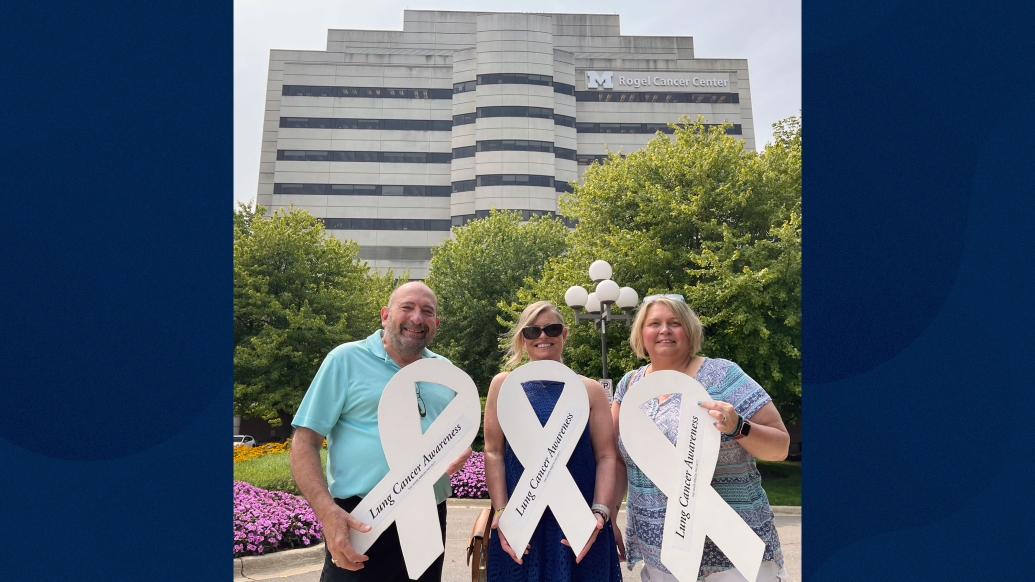Following an unexpected diagnosis, one woman pushes for screening to include many who aren't aware they're even at risk
2:06 PM

This article was written by Alina Keshwani, Alisha Keshwani and includes contributions from Sania Choudhary and Amber Wei.
For years, prior to her diagnosis, Deborah Pickworth, from Garden City, Mich., went to the hospital frequently for bronchitis.
Because of this, at age 43, Pickworth finally insisted she get ordered a low dose CT scan, which led to her diagnosis of pleural effusion.
The lung cancer was confirmed after her lung fluids were biopsied.
“I never thought it could happen to me,” Pickworth said.
“I didn’t smoke. I led a healthy lifestyle. But when I started experiencing persistent coughs and shortness of breath, I knew something had to be wrong.”
And her journey to diagnosis was anything but straightforward, she explains.
Given her age, and being that she was a non-smoker, Pickworth was ineligible for screening. But, overtime, and after examining her life more closely, she realized she had been exposed to other factors that could increase your risk of cancer.
Pickworth grew up in a household where most of her family smoked, resulting in her constant exposure to secondhand smoke. Pickworth also faced occupational hazards that are associated with lung cancer: Michigan is known for its automotive industry and manufacturing jobs, which make up 14.2% of the state's workforce. Pickworth worked in one of these roles, at a shoe repair and manufacturing plant, where chemicals such as plating dust and cobalt swirled around in the air for hours every day.
She believes those working conditions are also putting residents of Garden City, where the plant is located, at a much higher risk of developing lung cancer as well.
Creating awareness around lung cancer
"There's a lot of misinformation out there," she said.
"People often think lung cancer is solely related to smoking, but that's not the case. Occupational exposures, secondhand smoke, and even radon exposure in homes can increase your risk."
Pickworth has grown to become a strong advocate for not only raising awareness for what lung cancer is, but also educating others about these "less obvious" risk factors.
People often think lung cancer is solely related to smoking, but that's not the case. Occupational exposures, secondhand smoke, and even radon exposure in homes can increase your risk."
-Deborah Pickworth, patient and lung cancer advocate
Current guidelines by the United States Preventive Services Task Force say, to be eligible for screening, individuals must be aged 50 to 80, have a smoking history of at least 20 pack years, and either be currently smoking or have quit in the past 15 years.
The guidelines singular focus on smokers prompted Pickworth to get involved in changing the perception of when screening is needed for the disease.
"Lung cancer doesn't discriminate," she said. "It's not just a smoker's disease. Anyone can be at risk."
Working to make a difference in lung cancer awareness
Pickworth now works closely with various organizations, including the Food and Drug Administration, the Department of Defense and the American Lung Association to promote lung cancer awareness and encourage regular screenings.
She also earned the 2020 CURE Lung Cancer Heroes Award for her work in challenging the stigma associated with lung cancer.
Pickworth also emphasizes the need for better support systems for lung cancer patients, as few support groups exist for current patients and survivors.
In that effort, Pickworth founded a cancer foundation called BRAF Bombers, which includes a support group for people with her rare lung cancer mutation.

"When you're diagnosed, it feels isolating. There's a lack of resources compared to other cancers. We need more support groups, more research funding and more public understanding."
Many of Pickworth's family and friends from her hometown are still afraid to get screened because they would rather “not know if they had lung cancer.”
These attitudes, she explains, underscore the need for better community education about the benefits of screening, such as catching cancer at earlier stages when it’s more treatable.
Despite these challenges, though, she remains hopeful, and her experience has only strengthened her resolve to fight for better awareness and support.
"I'm here today because I advocated for myself,” she said.
“I want others to know that they can do the same. Don't ignore the symptoms, even if you think it can't happen to you."
Pickworth's story is a powerful reminder that lung cancer can touch anyone's life.
Her advocacy work continues to inspire and educate many, dispelling various misconceptions and promoting a future where early detection and support are available to all.
Read more on lung cancer risks and prevention information.
More on the authors:
Alisha Keshwani is a sophomore at the University of Michigan studying Biology, Health, and Society and Science, Technology, and Society with a concentration in Medicine. Keshwani works with the American Lung Cancer Screening Initiative and has founded a chapter of ALCSI with Alina Keshwani and Ella Kazerooni, M.D.
Alina Keshwani is a sophomore at the University of Michigan majoring in Biopsychology, Cognition, and Neuroscience. Her work involves research and leadership roles that aim to improve health outcomes, especially in areas related to lung cancer. Alina is the co-president and co-founder of ALCSI chapter at Michigan.
Sania Choudhary and Amber Wei are members of ALCSI.

Explore a variety of health care news & stories by visiting the Health Lab home page for more articles.

Department of Communication at Michigan Medicine
Want top health & research news weekly? Sign up for Health Lab’s newsletters today!





